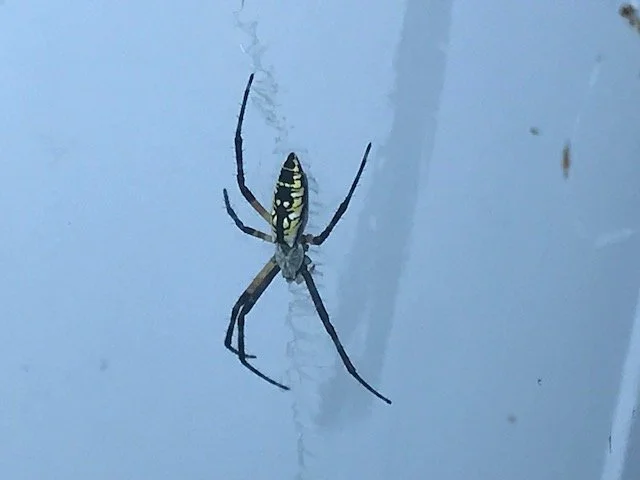There’s a dominant bug every summer. Last year it was stick insects. They were everywhere. If you put your hand on an outdoor chair or railing without checking first, your palm would land on a stick bug.
This year we thought it was going to be gnats. They came at our eyes and buzzed into our ears, leaving us foolishly waving at our faces. They got caught in our sweat and swam around in our dents and wrinkles, which tickled or stung, depending on the desperation level of the gnat. But as June aged and a bit of rain passed through, the gnats quit aiming for our moist orifices and we weren’t unhappy about that; though their retreat left room for the more predominant miscreants: Flies. I’m looking at one resting on the wall in front of me right now. We open the door to go out and a fly buzzes in. We come inside and a fly hovers along behind. I pause at the kitchen sink to put a few glasses in the dishwasher and four flies rise up, indignant that I’ve disturbed them at their leisure.
Flies. They’re annoying and I don’t like ’em. Once, many years ago, one of them buzzed lugubriously around my head and shoulders. So heavy and sluggish was it that when it landed on the kitchen table it occurred to me that I might be able squash it with my bare hand. Why I thought that’d be an interesting achievement I do not know. But reach out I did, and squash it I did. The wet body beneath my palm felt gross and when I pulled my hand away, the black carcus was covered with writhing maggots.
Excuse me. I must step away for a minute to wash my hands. Okay, I’m back.
When I was about twelve my father finished the addition he’d been building on to the back of our house. Instead of a cramped and squatty Craftsman-style three-bedroom home, we now had an extended living room with a slate floor, a fireplace with a broad hearth, an upstairs, and a basement. A household comprised of introverts, we used the space to put as much distance between us as we could. My older sister claimed the upper floor of the addition and I claimed the basement, which was dark and dank and cool even in August when the heat caused every plant and beast to long for death. From the outside, the new portion of the house loomed behind the original construction like an ill-conceived geometry project, but on the inside it was lovely.
My living area was composed of two large squares—one where I slept, read, and practiced my flute, which I did for hours every day; and considering the low ceiling and brick walls, the acoustics caused any grouping of notes to echo magnificently, which made it easy to fool myself into believing that I was indeed a magnificent flute player. And the other room was an open area in which I arranged a green leather chair and ottoman to face an old black-and-white television. During my first summer downstairs I painted alternate colors on the descending steps—red, gray, and light blue; and I painted the walls pink and the furniture red. It looked better than it sounds.
From the time my sister moved above and I moved below we spent very little time as a family. We were all hunched in our own remote chambers, going about our business in our separate paradises and communicating very little. For me, this was great. None of us got along all that well and developing far away from the parents’ watchful eyes and constant judgement gave me a freedom that I deeply appreciated.
I got off track. Bugs. As you can imagine, when it was a hundred degrees outside I wasn’t the only creature who found the pleasant temperatures underground to be delightful. All manner of bugs made their way to my sunken abode. Primarily spiders and crickets.
While technically spiders aren’t insects, they fit my personal definition, which is any creature that’s small, scary, and void of intelligence. My relationship with the spiders was convivial. Their corner webs caught smaller bugs like sowbugs, silverfish, and pill bugs. They were respectful, polite, and industrious, so I let them be.
What I came to loathe were crickets. In my resonant underground lair, the chirp of a single cricket was deafening—and for crickets, chirping is an all-night thing. From mid-June through mid-October I was robbed of my sleep on a nightly basis. When a body’s tired, battling crickets is frustrating and enraging. At first chirp I’d leap out of bed, grab the nearby can of bug spray, and then, due to the reverberance, be unable to pinpoint where the sound was coming from. The cricket’s battle technique was to crouch beneath the bed or behind the dresser until it was ready to hop out and make me scream; and then, as I sprayed half a can of poison on it, jump at my frightened legs until it died. It could take me as long as a half-hour to put a cricket down, at which point I’d pull out my flute and, making hyperbolical use of the lower register, play “Poor Jud is Dead,” the ironically mournful dirge from Oklahoma, dedicated to a man whom no one loved. Then I returned to my slumbers.
A spider is not an insect, but it kind of is.
This is a dead fly. If you’re a fly and you come into my house, this is how you’ll end up.
This is a worm, which is most definitely not a bug, but it meets my criteria.




